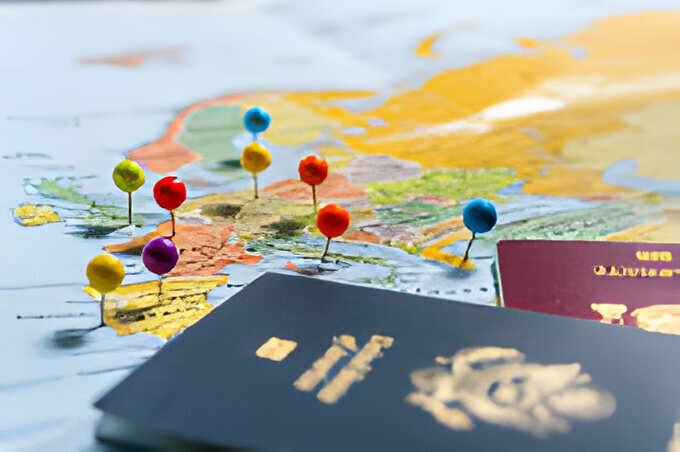How to Become a Travel Agent
Becoming a travel agent can be a rewarding career for those who enjoy helping others plan their dream vacations. Travel agents assist clients with everything from booking flights and hotels to creating custom itineraries and recommending local attractions. If you have a passion for travel and enjoy providing excellent customer service, becoming a travel agent may be the perfect career for you.
Steps to Becoming a Travel Agent
To become a travel agent, there are several steps you can take.
First, it’s necessary to research the industry and gain an understanding of the role of a travel agent. You can do this by reading articles and books on the subject, attending travel industry events, and speaking with experienced travel agents.
Additionally, it’s good to have excellent communication and organizational skills, as well as a strong attention to detail. These skills will be essential in helping you provide top-notch service to your clients.
Once you have a solid understanding of the travel industry and the skills required to be a successful travel agent, the next step is to gain experience in the field.
This can be done by working for a travel agency or by starting your own travel business. It’s also important to obtain any necessary certifications or licenses, such as a Certified Travel Associate (CTA) or a Travel Agent License.
With the right training and experience, you can build a successful career as a travel agent and help others create unforgettable travel experiences.
Understanding the Travel Industry
Types of Travel Agencies
There are various types of travel agencies in the industry, each with its unique features and target market. The following are some of the most common types of travel agencies:
- Corporate Travel Agencies: These agencies specialize in providing travel services to businesses and corporate clients. They help companies manage their travel expenses and ensure that their employees travel safely and efficiently.
- Leisure Travel Agencies: These agencies cater to individual travelers who are looking for vacation packages, tours, and other travel-related services. They often specialize in specific destinations or types of travel, such as adventure travel or luxury travel.
- Online Travel Agencies (OTAs): These agencies operate exclusively online and allow customers to book travel services through their websites. They often offer competitive prices and a wide range of options, but may not provide the same level of personalized service as traditional travel agencies.
Key Industry Players
The travel industry is dominated by a few key players who have a significant impact on the market. The following are some of the most influential companies in the travel industry:
- Airlines: Airlines are a critical component of the travel industry, providing transportation services to travelers around the world. Some of the largest airlines include Delta, American Airlines, and United Airlines.
- Hotel Chains: Hotel chains such as Marriott, Hilton, and Hyatt operate thousands of hotels worldwide and provide lodging services to millions of travelers each year.
- Cruise Lines: Cruise lines such as Carnival, Royal Caribbean, and Norwegian Cruise Line offer travelers a unique way to explore the world by sea, with onboard amenities and activities that cater to a wide range of interests.
Knowing the different types of travel agencies and key industry players is essential for anyone looking to become a travel agent. When you stay up-to-date with industry trends and developments, travel agents can provide their clients with the best possible service and help them navigate the complex world of travel.
Qualifications and Skills Required
Education and Certification
Becoming a travel agent requires a certain level of education and certification. While a college degree is not always required, it can help gain the knowledge and skills necessary to succeed in the industry. A degree in hospitality, tourism, or business can be particularly beneficial.
In addition to formal education, travel agents must also obtain certification. The most recognized certification in the industry is the Certified Travel Associate (CTA) or Certified Travel Counselor (CTC) from The Travel Institute. These certifications demonstrate a level of expertise and professionalism that can set a travel agent apart from others in the field.
Essential Skills for Success
In addition to education and certification, there are essential skills that a travel agent must possess to be successful. These skills include:
- Attention to detail: Travel agents must be meticulous and thorough in their work, ensuring that every detail of a client’s trip is planned and executed flawlessly.
- Communication skills: Travel agents must be able to effectively communicate with clients, suppliers, and other industry professionals. This includes listening actively, asking questions, and conveying information clearly and concisely.
- Sales skills: Travel agents must be able to sell their services and persuade clients to book trips through them. This requires a combination of knowledge, confidence, and persuasion.
- Customer service skills: Travel agents must be able to provide exceptional customer service, responding to client needs and concerns in a timely and professional manner.
- Adaptability: Travel agents must be able to adapt to changing circumstances, such as flight cancellations or unexpected changes to travel plans.
By possessing these skills and obtaining the necessary education and certification, aspiring travel agents can position themselves for success in the industry.
Read also: Top 10 Visa Sponsorship Jobs in Canada: How to Apply Now
Building Your Business
Creating a Business Plan
To become a successful travel agent, it is essential to have a well-crafted business plan.
This plan should outline your goals, target market, marketing strategies, and financial projections. You can use resources such as the Small Business Administration to help you create a business plan.
When creating your business plan, consider the following questions:
- What are your short-term and long-term goals?
- Who is your target market?
- What services will you offer?
- What are your startup costs?
- How will you finance your business?
- What are your projected revenues and expenses?
By answering these questions, you can create a solid business plan that will guide your decision-making and help you achieve your goals.
Marketing Strategies
Marketing is crucial for the success of any business, and travel agencies are no exception. To attract clients, you need to develop effective marketing strategies. Here are some ideas to get you started:
- Create a website that showcases your services and expertise.
- Use social media platforms like Facebook, Instagram, and Twitter to promote your business.
- Attend travel trade shows and events to network with other professionals in the industry.
- Offer referral incentives to clients who refer new business to you.
- Develop partnerships with other businesses in the travel industry, such as hotels, airlines, and tour operators.
By implementing these marketing strategies, you can increase your visibility and attract more clients to your business.
Establishing Supplier Relationships
As a travel agent, you will need to establish relationships with suppliers such as airlines, hotels, and tour operators. These relationships are essential for securing the best rates and deals for your clients.
To establish supplier relationships, consider the following steps:
- Attend travel trade shows and events to network with suppliers.
- Research different suppliers and compare their rates and services.
- Negotiate contracts with suppliers to secure the best rates and deals for your clients.
- Build strong relationships with suppliers by providing excellent customer service and paying invoices on time.
By establishing strong supplier relationships, you can provide your clients with the best possible travel experiences while also growing your business.





